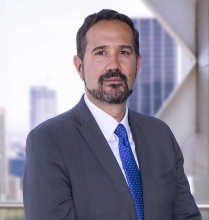International Arbitration Newsletter - September 2020 | Regional Overview: Middle East and Africa
The most relevant updates from Middle East and Africa from the global International Arbitration and ADR practice group at Garrigues.
KAZAKHSTAN
UNCITRAL tribunal finds that Kazakhstan is not bound by Soviet Union treaty
Kazakhstan has defeated a claim filed by Canadian joint venture Gold Pool after an UNCITRAL tribunal held that it lacked jurisdiction and dismissed the case.
The tribunal found that the Canada-USSR BIT was not binding on Kazakhstan, as Kazakhstan was not the legal successor to the treaty.
The Canadian company – jointly owned at that moment by Kazakhstan Goldfields and Central Asia Goldfields– won a public tender to manage three gold mines in the country and state-owned Kazakhaltyn JSC.
Kazakhstan contended that the contract was terminated in 1997, when Kazakhaltyn was nearly bankrupt. Gold Pool then filed a commercial arbitration claim against the government, but the claim expired in 2000.
Gold Pool pursued afterwards a PCA arbitration under the Canada-USSR BIT, which was signed before Kazakhstan became an independent state. Kazakhstan argued that there was no evidence of the country´s legal succession to the treaty and the tribunal agreed.
MADAGASCAR
Madagascar applies to set aside clothes factory award
Madagascar has filed a petition for annulment of an ICSID award that ordered it to pay US$ 7 million to two Belgian brothers –Peter and Kristof De Sutter– whose clothes factory was looted and burned down during a period of civil unrest that followed a coup in the country in 2009.
The arbitral tribunal found the state liable for the damages caused to Polo Garmets, the clothes manufacturing company owned by the De Sutters. The liability derived from the bilateral investment treaty between the Belgium-Luxembourg Economic Union and Madagascar signed in 2005.
In 2016, the Paris Court of Appeal set aside the award issued by a sole arbitrator as a result of the claim filed by the same investors under the said BIT. Although the brothers sought €10 million in damages, the award rejected the De Sutters’ claim for the principal amount of the debt and ordered Madagascar to pay €700,000 for breach the fair and equitable treatment standard of the treaty through the conduct of its Supreme Court, which appeared concerned to protect the local insurer from an unfavorable decision. The annulment of this award was rendered on the grounds that the arbitrator violated due process by deciding the case on grounds not raised by the parties.
Following the annulment of the award, the brothers filed the ICSID claim that resulted in the award Madagascar is now seeking to annul.
NIGERIA
Nigeria granted an extension of time to challenge US$ 10 billion award
A UK Court has granted Nigeria’s request to pursue a late challenge to a US$ 6.6 billion (US$ 10 billion including interest accrued since 2013) award rendered in favor of the British Virgin Islands-registered Process & Industrial Developments (P&ID) over a failed gas sales and purchase agreement.
Nigeria had sought permission to appeal the award for it to be set aside, despite having missed the original 28-day appeal deadline. It said new evidence only came to light in late 2019. The judge found that the circumstances of the case justified granting Nigeria more time to challenge the award rendered between three-and-a-half and five years ago.
Nigeria is seeking to overturn the decision alleging evidence of corruption in the contract perpetrated by P&ID. It alleges that P&ID procured the contract by paying bribes to Nigerian officials, that P&ID made payments to the chairman of the Ministry of Petroleum Committee who approved the project and that P&ID’s main witness in the arbitration proceedings, its now-deceased Irish co-founder Michael Quinn, gave perjured evidence to the tribunal.
The London Commercial Court has ruled that Nigeria has presented “a strong prima facie case” that the contract was fraught with corrupt dealings and that those allegations might be backed up by evidence that had now come to light.
SIERRA LEONE
ICSID tribunal permits Sierra Leone to pursue criminal proceedings
The tribunal in an ICSID arbitration between Sierra Leone and Gerald International has allowed the state to pursue its criminal case against several of the claimant´s local employees that had allegedly incited a riot.
Gerald filed the ICSID claim, under the UK-Sierra Leone BIT, holding that the country´s government made SL Mining, who held a licence agreement for its iron ore project in the country, to renegotiate the licence agreement.
SL Mining and Gerald filed two claims against the country: the ICSID arbitration and an ICC arbitration under its licence agreement with the government. On the ICSID claim, Gerald maintains that Sierra Leone has breached the fair and equitable treatment and expropriation included in the BIT.
These filings were preceded by Sierra Leone pursuing police investigations and imposing a shipping prohibition on SL Mining, blocking exports. Sierra Leone defends the suspension and termination of the licence of SL Mining based on the company´s breaches, while SL Mining states that is not involved in any way in the riot commenced by the company´s employees and that is being investigated by the police.
The tribunal ruled that preventing Sierra Leone from pursuing the criminal proceedings would be too much of an interference of the country´s right to pursue violent crimes, although it noted the “temporal coincidence” and asked Sierra Leone to adapt the bail conditions of the employees, allowing them to return to the mines.
Contacts




-
+52 55 1102 3570
-
+57 601 326 69 99


